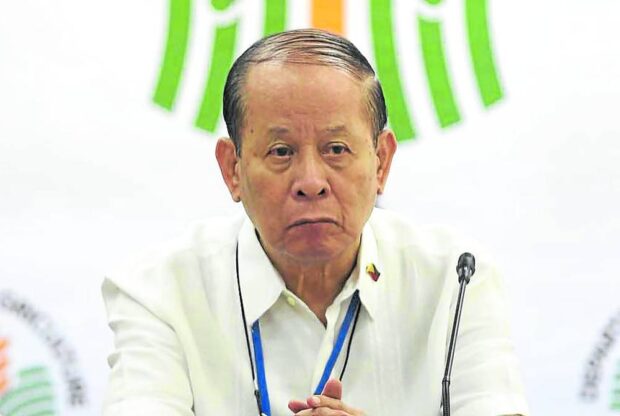
Agriculture Senior Undersecretary Domingo Panganiban (Photo by NIÑO JESUS ORBETA / Philippine Daily Inquirer)
MANILA, Philippines — Senior Undersecretary Domingo Panganiban of the Department of Agriculture (DA) is facing graft charges in the Office of the Ombudsman for his alleged role in the sugar import controversy in February wherein he supposedly favored sugar traders to allegedly smuggle 250,000 metric tons of sugar into the country.
In a 16-page complaint filed on Monday, the National Congress of Unions in the Sugar Industry of the Philippines-Agrarian Reform Beneficiaries Council (Nacusip-ARB) and the Alternatiba ng Masa party list asked the Ombudsman to indict Panganiban for usurping authority and for violating Section 3 of Republic Act No. 3019, or the Anti-Graft and Corrupt Practices Act, which lists unscrupulous practices of public officers.
“Sugar farmers and workers in the sugar industry have been gravely affected by the sudden influx of imported sugar in the market,” said Nacusip-ARB council director Roland dela Cruz. “This is aggravated by the fact that what entered our country is smuggled sugar, seemingly facilitated by none other than a senior official of the Department of Agriculture.”
“We cannot let this pass,” he added.
The case stems from a shipment of refined sugar that entered the country on Feb. 9 that was flagged by the Bureau of Customs for lacking permits.
It was later revealed that the shipment, consigned to All Asian Countertrade Inc., was part of a 440,000 MT importation under Sugar Order No. 6, also signed by Panganiban reportedly under the directive of President Marcos, who sits as concurrent agriculture secretary, in an effort to bring down sugar prices.
What was irregular, however, was that the shipment arrived well before SO No. 6 became effective on Feb. 22, the complainants said.
Bad faith, partiality
Panganiban later admitted that he had instructed “three capable and accredited companies to proceed with the importation of sugar” as early as January when Executive Secretary Lucas Bersamin issued a memorandum allowing the sugar importation.
In filing the case, the groups argued that an SO was a “necessary prerequisite to importation, otherwise, it is considered a smuggled agricultural product,” also pointing out that only the Sugar Regulatory Administration (SRA) has the sole power to issue an import order for the commodity.
By directing three importers as early as January to import sugar without an SO, they said Panganiban had “undermined and usurped” the function of the SRA board.
Moreover, they said Panganiban “has no power under the law to unilaterally choose and direct only three traders to proceed with the importation.”
The groups also questioned Panganiban’s handpicking of three traders—All Asian Countertrade Inc., S&D Sucden Philippines and Edison Lee Marketing Corp.—out of more than 100 available traders.
“What Panganiban did when he directed these companies prior to SO No. 6 shows his evident bad faith, gross inexcusable negligence, and manifest partiality,” the groups noted.
“By allowing such a huge bulk of sugar to be imported during this time lowered the price of sugarcane being sold by our sugar planters,” the groups said, and that “the effects of these events to our constituents, the sugar workers and planters, cannot be understated.”
Nothing illegal
“Our constituents have toiled day and night for more or less 10 months just to harvest their product just to be shortchanged because of the influx of imported sugar,” the groups said. “Panganiban did not just commit an illegal act, but an unpatriotic act.”
Reacting to the graft complaint, Agriculture Assistant Secretary Rex Estoperez said there was no graft and corruption involved in the importation.
“I don’t know what’s the basis of the complaint because the executive secretary explained that [Panganiban] acted on the instructions of the President and the executive secretary,” Estoperez said.
At the Senate blue ribbon committee hearing on the questioned sugar transaction last May, Bersamin insisted that the order to import was “legitimate and fully authorized by the government.”
Bersamin, a former Supreme Court chief justice, added the issuance of a sugar order was not a prerequisite for importation.